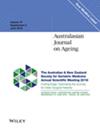Australian medical practitioners' perspectives about current practice relating to fitness to drive assessment for older people with dementia and mild cognitive impairment: A qualitative study
Abstract
Objectives
To describe the perspectives of Australian medical practitioners about current practice, and the potential benefit of tools and resources to support fitness to drive assessment for older people with dementia and mild cognitive impairment (MCI).
Methods
Semi-structured interviews with 22 medical practitioners from cognitive/memory clinics, hospitals, general practice and driving fitness assessment services in Australia. Reflexive thematic analysis was conducted.
Results
Two overarching themes were generated: (1) Uncomfortable decisions, describing feelings of discomfort expressed by practitioners about making fitness to drive recommendations, with two subthemes: (a) ‘Feeling uncertain’ and (b) ‘Sticking your neck on the line’; and (2) Easing the discomfort, describing participants' desire for tools/resources to support practitioners to increase comfort with fitness to drive recommendations, with two subthemes: (a) ‘Seeking certainty’ and (b) ‘Focusing on the process’ conveying two different perspectives about how this may be achieved. There was a desire for a new in-office assessment tool capable of accurately predicting fitness to drive outcomes and views that an evidence-based clinical pathway could improve practitioners' confidence in decision-making.
Conclusions
Perceptions of discomfort relating to fitness to drive assessment of older people with dementia and MCI exist amongst medical practitioners from health-care settings across Australia. In the absence of a well-validated in-office assessment tool, practitioners may benefit from an evidence-based clinical pathway to guide driving recommendations.

 求助内容:
求助内容: 应助结果提醒方式:
应助结果提醒方式:


